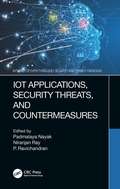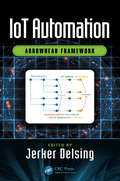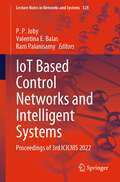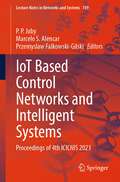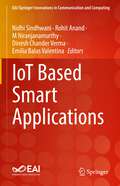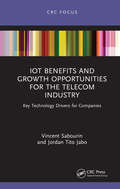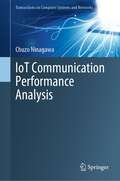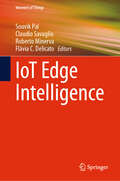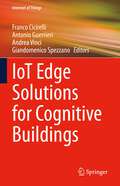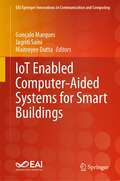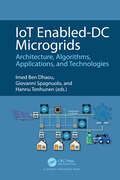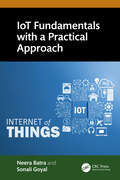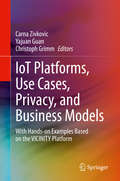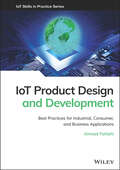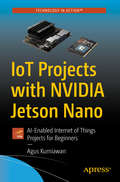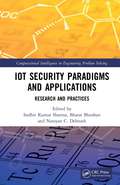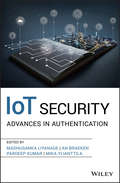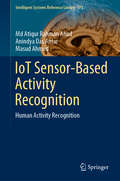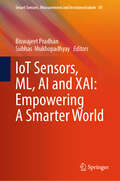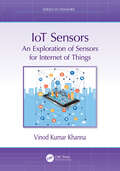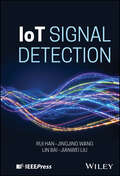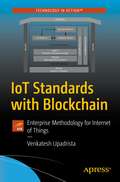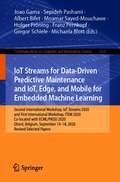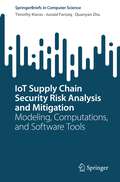- Table View
- List View
IoT Applications, Security Threats, and Countermeasures (Internet of Everything (IoE))
by Padmalaya Nayak Niranjan Ray P. RavichandranThe book explores modern sensor technologies while also discussing security issues, which is the dominant factor for many types of Internet of Things (IoT) applications. It also covers recent (IoT) applications such as the Markovian Arrival Process, fog computing, real-time solar energy monitoring, healthcare, and agriculture. Fundamental concepts of gathering, processing, and analyzing different Artificial Intelligence (AI) models in IoT applications are covered along with recent detection mechanisms for different types of attacks for effective network communication. On par with the standards laid out by international organizations in related fields, the book focuses on both core concepts of IoT along with major application areas. Designed for technical developers, academicians, data scientists, industrial researchers, professionals, and students, this book is useful in uncovering the latest innovations in the field of IoT.
IoT Automation: Arrowhead Framework
by Jerker DelsingThis book presents an in-depth description of the Arrowhead Framework and how it fosters interoperability between IoT devices at service level, specifically addressing application. The Arrowhead Framework utilizes SOA technology and the concepts of local clouds to provide required automation capabilities such as: real time control, security, scalability, and engineering simplicity. Arrowhead Framework supports the realization of collaborative automation; it is the only IoT Framework that addresses global interoperability across multiplet SOA technologies. With these features, the Arrowhead Framework enables the design, engineering, and operation of large automation systems for a wide range of applications utilizing IoT and CPS technologies. The book provides application examples from a wide number of industrial fields e.g. airline maintenance, mining maintenance, smart production, electro-mobility, automative test, smart cities—all in response to EU societal challenges. <P><P>Features <li>Covers the design and implementation of IoT based automation systems. <li>Industrial usage of Internet of Things and Cyber Physical Systems made feasible through Arrowhead Framework. <li>Functions as a design cookbook for building automation systems using IoT/CPS and Arrowhead Framework. <li>Tools, templates, code etc. described in the book will be accessible through open sources project <li>Arrowhead Framework Wiki at forge.soa4d.org/ <li>Written by the leading experts in the European Union and around the globe.
IoT Based Control Networks and Intelligent Systems: Proceedings of 3rd ICICNIS 2022 (Lecture Notes in Networks and Systems #528)
by Valentina E. Balas Ram Palanisamy P. P. JobyThis book gathers selected papers presented at International Conference on IoT Based Control Networks and Intelligent Systems (ICICNIS 2022), organized by St. Joseph’s College of Engineering and Technology, Kottayam, Kerala, India, during July 1–2, 2022. The book covers state-of-the-art research insights on Internet of things (IoT) paradigm to access, manage, and control the objects/things/people working under various information systems and deployed under wide range of applications like smart cities, health care, industries, and smart homes.
IoT Based Control Networks and Intelligent Systems: Proceedings of 4th ICICNIS 2023 (Lecture Notes in Networks and Systems #789)
by Marcelo S. Alencar Przemyslaw Falkowski-Gilski P. P. JobyThis book gathers selected papers presented at International Conference on IoT Based Control Networks and Intelligent Systems (ICICNIS 2023), organized by School of Computer Science and Engineering, REVA University, Bengaluru, India, during June 21–22, 2023. The book covers state-of-the-art research insights on Internet of things (IoT) paradigm to access, manage, and control the objects/things/people working under various information systems and deployed under wide range of applications like smart cities, healthcare, industries, and smart homes.
IoT Based Smart Applications (EAI/Springer Innovations in Communication and Computing)
by Dinesh Chander Verma Nidhi Sindhwani Rohit Anand M Niranjanamurthy Emilia Balas ValentinaThis book provides insights into IoT, its applications, and various implementation techniques. The authors first discuss the IoT design methodology to define the domain model. They then cover various connection methodologies used in IoT such as Ethernet, Wi-Fi, low powered wide area network (LPWAN), Bluetooth, RFID, cellular, and satellite, and more, along with their challenges. An example is made on the designing process using Arduino, which offers smart, connected, and secure elements; they also illustrate the integration of IoT with Blockchain, cloud, machine learning, big data, embedded software, sensors, etc. The book going on to cover the future of IoT in various sectors and how IoT will continue to be game-changing technology.
IoT Benefits and Growth Opportunities for the Telecom Industry: Key Technology Drivers for Companies
by Vincent Sabourin Jordan Tito JaboThis critical and forward-looking book features: An assessment of the impact of Internet of Things (IoT) on the telecom industry’s revenue streams IoT-based business models in the telecom industry A PESTLE (political, economic, socio-cultural, technological, legal, and environmental) analysis of the industry in relation to IoT Key technological drivers. It also features a case study of Bell Canada Enterprises (BCE) Inc., which highlights IoT-based business models in the industry. The study reveals that telecom operators have started implementing IoT projects, however, true revenue streams are yet to materialize. Ten IoT-based business models have been identified at BCE Inc. The book points out that operators do leverage existing infrastructure in terms of broadband fiber and mobile connectivity in part and resort to partnerships and acquisitions to acquire much-needed knowledge, technology, and smart devices. Concerning the effect of IoT on the telecoms’ revenue streams, it was revealed that new entrants, who are not necessarily in the telecom industry, have impacted the old players’ revenue streams. OTT services like YouTube, WhatsApp, IPTV, Netflix, are the biggest culprits. Seven key technological drivers for IoT have been identified and include widespread wireless connectivity, the availability and affordability of microcontrollers, sensors and actuators, the decreasing cost of bandwidth, the recent implementation of IPv6, and the ongoing development of 5G network, as well as the use of cloud computing and analytics. Finally, the PESTLE analysis of the industry shows that the lack of a comprehensive political and regulatory framework still slows down IoT deployment. Interoperability, security, and privacy concerns are other constraints. Conversely, general economic conditions in most developed and developing economies are favorable to the advancement of IoT technology. Governments are willing to subsidize R&D and have partnered with the private sector to speed up the roll-out process.
IoT Communication Performance Analysis (Transactions on Computer Systems and Networks)
by Chuzo NinagawaThis book deals with analysis techniques for TCP, UDP, Web, and SOAP data transmission performance on the IoT cloud side, CSMA-type, and multi-hop data transmission performance on the IoT edge side, as well as gateway receives buffer and transmit packet assembly data transmission performance.As mathematical tools for the analysis of communication performance, universal analysis methods such as stochastic processes, queues, Markov processes, and communication traffic simulators are applied to actual examples, and their usage is described in detail. This book aims to provide lifelong skills for analyzing communication performance that will serve as the basis for the future evolution of the IoT.
IoT Edge Intelligence (Internet of Things)
by Flávia C. Delicato Roberto Minerva Souvik Pal Claudio SavaglioThis book explores fundamental and advanced concepts related to the AI-enabled Edge Technology paradigm, also known as Edge Intelligence, within the framework of the Internet of Things (IoT). Expanding the application of Edge computing is increasingly necessary. This can involve exploring automated, intelligent computational learning theorems, and ANN-oriented, trustworthy machine learning perspectives to enhance computational intelligence. The book functions as a valuable resource for professionals in the sector and also acts as a comprehensive learning tool for newcomers in the field of AI-enabled Edge Technologies and their applications, covering both fundamental and advanced concepts. This book uses data and network engineering and intelligent decision support system-by-design principles to design a reliable IoT edge-cloud ecosystem and to implement cyber-physical pervasive infrastructure solutions. The book will help readers understand the design architecture and AI algorithms and learn analytics through IoT edge, device-edge and the state-of-the-art in cloud-IoT countermeasures. The book is a valuable reference for anyone doing undergraduate or postgraduate studies, conducting research, or working in the computer science, information technology, electronics engineering, and complicated mathematical modeling domains.
IoT Edge Solutions for Cognitive Buildings (Internet of Things)
by Antonio Guerrieri Giandomenico Spezzano Franco Cicirelli Andrea VinciThis book outlines the promise of the field of the Cognitive Internet of Things when it is applied to cognitive buildings. After an introduction, the authors discuss the goals of cognitive buildings such as operation in a more efficient, flexible, interactive, intuitive, and sustainable way. They go on to outline the benefits that these technologies promise to building owners, occupants, and their environments that range from reducing energy consumption and carbon footprint to promoting health, well-being, and productivity. The authors outline technologies that provide buildings and equipment with the ability to collect, aggregate, and analyze data and how this information can be collected by sensors and related to internal conditions and settings, energy consumption, user requests, and preferences to maintain comfort and save energy. This book is of interest to practitioners, researchers, students, and professors in IoT and smart cities.
IoT Enabled Computer-Aided Systems for Smart Buildings (EAI/Springer Innovations in Communication and Computing)
by Maitreyee Dutta Gonçalo Marques Jagriti SainiThis book focuses on the integration of IoT and computer aided systems for the development of smart buildings. The scope of the book includes, but is not restricted to, advanced technologies for monitoring, energy management, smart gardening, protection, safety, assisted living, and intelligent operations. The authors cover the wide aspects of interconnected smart services with convenient interfacing to the end-users. The features of this book include discussion on various aspects of IoT and computer aided systems for smart architecture designs and innovative object interconnections. The book also provides highlights on the applications of IoT in the development of intelligent structures for technology-enabled lifestyles. Furthermore, it provides prominent scopes for future inventions in the field of electrical engineering, building system management, and computer-aided advancements. The content of this book is useful to graduate and post-graduate students, researchers, and professionals working on the concept of smart building, smart city, and smart environments.
IoT Enabled-DC Microgrids: Architecture, Algorithms, Applications, and Technologies
by Giovanni Spagnuolo Hannu Tenhunen Imed Ben DhaouSmart grid is a new generation of power grids that is expected to enhance its reliability and reduce carbon footprint by integrating distributed resources. Microgrid technology allows the integration of renewable energies, which come in three modes: AC, DC, or hybrid. The increasing number of DC loads, the need to reduce power loss in converting DC power to AC, and the existence of DC storage units have favored the adoption of DC microgrids. The electrification of the transportation sector has further supported the adoption of DC microgrids. A DC microgrid system comprises renewable resources, DC storage elements, DC loads, and intelligent electrical devices. It has gained interest due to its efficiency, scalability, and cost-effectiveness. DC microgrids play a crucial role in powering diverse applications such as data centers, residential areas, base stations, and electric vehicle charging stations.This book covers the design, control, and management of DC microgrids in both islanded and grid-connected modes. It focuses on ICT infrastructure, security, sensors, embedded systems, machine learning algorithms, edge/fog computing, and the socio-economic impact.
IoT Fundamentals with a Practical Approach
by Sonali Goyal Neera BatraIoT Fundamentals with a Practical Approach is an insightful book that serves as a comprehensive guide to understanding the foundations and key concepts of Internet of Things (IoT) technologies.The book begins by introducing readers to the concept of IoT, explaining the significance and potential impact on various industries and domains. It covers the underlying principles of IoT, including its architecture, connectivity, and communication protocols, providing readers with a solid understanding of how IoT systems are structured and how devices interact within an IoT ecosystem.This book dives into the crucial components that form the backbone of IoT systems. It explores sensors and actuators, explaining their roles in collecting and transmitting data from the physical environment. The book also covers electronic components used in IoT devices, such as microcontrollers, communication modules, and power management circuits. This comprehensive understanding of the building blocks of IoT allows readers to grasp the technical aspects involved in developing IoT solutions.Security is a vital aspect of IoT, and the book dedicates a significant portion to exploring security challenges and best practices in IoT deployments. It delves into topics such as authentication, encryption, access control, and secure firmware updates, providing readers with essential insights into safeguarding IoT systems against potential threats and vulnerabilities.This book also addresses the scalability and interoperability challenges of IoT. It discusses IoT platforms and frameworks that facilitate the development and management of IoT applications, highlighting their role in enabling seamless integration and communication between devices and systems.The book is written in a clear and accessible manner and includes real-world examples, making it suitable for both beginners and professionals looking to enhance their understanding of IoT. It serves as a valuable resource for engineers, developers, researchers, and decision-makers involved in IoT projects and provides them with the knowledge and tools necessary to design, implement, and secure IoT solutions.
IoT Platforms, Use Cases, Privacy, and Business Models: With Hands-on Examples Based on the VICINITY Platform
by Christoph Grimm Carna Zivkovic Yajuan GuanThis book provides a comprehensive and consistent introduction to the Internet of Things. Hot topics, including the European privacy legislation GDPR, and homomorphic encryption are explained. For each topic, the reader gets a theoretical introduction and an overview, backed by programming examples. For demonstration, the authors use the IoT platform VICINITY, which is open-source, free, and offers leading standards for privacy. Presents readers with a coherent single-source introduction into the IoT;Introduces selected, hot-topics of IoT, including GDPR (European legislation on data protection), and homomorphic encryption;Provides coding examples for most topics that allow the reader to kick-start his own IoT applications, smart services, etc.
IoT Product Design and Development: Best Practices for Industrial, Consumer, and Business Applications (IoT Skills in Practice)
by Ahmad FattahiIoT Product Design and Development Learn to incorporate IoT products into the process of building a product Internet of Things (or IoT) is currently one of the central building blocks of industry. It is the driving technology of the connected world—be it smart cars, smart homes, smart factories, or smart cities. Industrial IoT (IIoT) is one of the most impactful areas of the global market, where it has fundamentally altered industries as varied as manufacturing, electronics, automotive, consumer goods, healthcare, and process industries like oil and gas, among others. As such, it is essential that engineers working in these fields improve their IoT knowledge to keep pace with this growing demand. IoT Product Design and Development offers an accessible entry point to the methods, techniques, and best practices necessary to add IoT onto an existing product or to build new IoT products wholesale. To accomplish this, the volume examines product design requirements for industrial, business, and consumer applications. Relying on real-world examples, the book provides a blueprint of the creation process, including tips on best practices and common pitfalls. Readers will thereby gain the tools to bring IoT to specific industries and job functions. IoT Product Design and Development readers will also find: Concise content that is targeted to what practitioners need to know without the academic jargon In-depth case studies related to power distribution systems, airports, and consumer home products Diagrams and tables used liberally to present concepts in a visual way Additional sidebar examples are included throughout the book to highlight key issues like IoT security and product lifecycle IoT Product Design and Development is a useful reference for professional mechanical, electrical, and industrial engineers, as well as IoT product managers, business leads, software and hardware professionals, and data professionals.
IoT Projects with Arduino Nano 33 BLE Sense: Step-By-Step Projects for Beginners
by Agus KurniawanGet started with the extremely versatile and powerful Arduino Nano 33 BLE Sense, a smart device based on the nRF52840 from Nordic semiconductors. This book introduces you to developing with the device.You'll learn how to access Arduino I/O such as analog and digital I/O, serial communication, SPI and I2C. The book also covers how to access sensor devices on Arduino Nano 33 BLE Sense, how to interact with other external devices over BLE, and build embedded Artificial Intelligence applications.Arduino Nano 33 BLE Sense consists of multiple built-in sensors such as 9-axis inertial, humidity, temperature, barometric, microphone, gesture, proximity, light color and light intensity sensors. With this book, you'll see how this board supports the Bluetooth Low Energy (BLE) network, enabling interactions with other devices over the network.What You’ll LearnPrepare and set up Arduino Nano 33 BLE Sense boardOperate Arduino Nano 33 BLE Sense board hardware and softwareDevelop programs to access Arduino Nano 33 BLE Sense board I/OBuild IoT programs with Arduino Nano 33 BLE Sense boardWho This Book Is ForMakers, developers, students, and professionals at any level interested in developing with the Arduino Nano 33 BLE Sense board.
IoT Projects with NVIDIA Jetson Nano: AI-Enabled Internet of Things Projects for Beginners
by Agus KurniawanExplore the capabilities of the NVIDIA Jetson Nano, an IoT device designed to perform computations like a computer desktop. This book will show you how to build your first project and optimize your devices, programs, and daily activities with the AI computation abilities of the Jetson Nano. This board consists of CPU Quad-core ARM A57 @ 1.43 GHz and GPU 128-core Maxwell. With this hardware specification, the board can run multiple neural networks in parallel for complex AI applications. With the integrated sensor and actuators, this board enables stronger IoT solutions and provides more advanced capabilities.Discover how develop complex IoT projects with the Jetson Nano today.What You’ll LearnSet up NVIDIA Jetson Nano deviceBuild applications like image classification, object detection, segmentation, and speech processingUse the Jetson Nano to process daily computer activities such as browsing the internet, checking emails, or playing music and videosImplement machine learning computations into your projectsWho This Book Is ForMakers, developers, students, and professional of all levels who are new to the NVIDIA Jetson Nano technology.
IoT Security Paradigms and Applications: Research and Practices (Computational Intelligence in Engineering Problem Solving)
by Bharat Bhushan Narayan C. Debnath Sudhir Kumar SharmaIntegration of IoT (Internet of Things) with big data and cloud computing has brought forward numerous advantages and challenges such as data analytics, integration, and storage. This book highlights these challenges and provides an integrating framework for these technologies, illustrating the role of blockchain in all possible facets of IoT security. Furthermore, it investigates the security and privacy issues associated with various IoT systems along with exploring various machine learning-based IoT security solutions. This book brings together state-of-the-art innovations, research activities (both in academia and in industry), and the corresponding standardization impacts of 5G as well. Aimed at graduate students, researchers in computer science and engineering, communication networking, IoT, machine learning and pattern recognition, this book Showcases the basics of both IoT and various security paradigms supporting IoT, including Blockchain Explores various machine learning-based IoT security solutions and highlights the importance of IoT for industries and smart cities Presents various competitive technologies of Blockchain, especially concerned with IoT security Provides insights into the taxonomy of challenges, issues, and research directions in IoT-based applications Includes examples and illustrations to effectively demonstrate the principles, algorithm, applications, and practices of security in the IoT environment
IoT Security: Advances in Authentication
by Madhusanka LiyanageAn up-to-date guide to an overview of authentication in the Internet of Things (IoT) The Internet of things (IoT) is the network of the countless physical devices that have the possibility to connect and exchange data. Among the various security requirements, authentication to the IoT is the first step to prevent the impact of attackers. IoT Security offers an important guide into the development of the many authentication mechanisms that provide IoT authentication at various levels such as user level, device level and network level. The book covers a wide range of topics including an overview of IoT and addresses in detail the security challenges at every layer by considering both the technologies and the architecture used. The authors—noted experts on the topic—provide solutions for remediation of compromised security, as well as methods for risk mitigation, and offer suggestions for prevention and improvement. In addition, IoT Security offers a variety of illustrative use cases. This important book: Offers an authoritative reference designed for use by all IoT stakeholders Includes information for securing devices at the user, device, and network levels Contains a classification of existing vulnerabilities Written by an international group of experts on the topic Provides a guide to the most current information available on IoT security Written for network operators, cloud operators, IoT device manufacturers, IoT device users, wireless users, IoT standardization organizations, and security solution developers, IoT Security is an essential guide that contains information on security features, including underlying networks, architectures, and security requirements.
IoT Sensor-Based Activity Recognition: Human Activity Recognition (Intelligent Systems Reference Library #173)
by Md Atiqur Ahad Anindya Das Antar Masud AhmedThis book offer clear descriptions of the basic structure for the recognition and classification of human activities using different types of sensor module and smart devices in e.g. healthcare, education, monitoring the elderly, daily human behavior, and fitness monitoring. In addition, the complexities, challenges, and design issues involved in data collection, processing, and other fundamental stages along with datasets, methods, etc., are discussed in detail. The book offers a valuable resource for readers in the fields of pattern recognition, human–computer interaction, and the Internet of Things.
IoT Sensors, ML, AI and XAI: Empowering A Smarter World (Smart Sensors, Measurement and Instrumentation #50)
by Biswajeet Pradhan Subhas MukhopadhyayThis book uncovers and presents various real-life applications in the areas of transportation, smart cities, manufacturing, agriculture, disaster management, finance, health care and in other areas by using cutting-edge advanced Machine Learning (ML) techniques such as Deep Learning and Explainable AI (XAI) models using IoT sensor data. The book provides various examples of analyzing large amounts of data, detecting patterns, and making predictions in real-time applications and detailed case studies with practical solutions using various state-of-the-art machine learning and IoT sensor data and all these aspects will benefit the stakeholders. The book is useful for academics, researchers, upper-undergraduate, master and Ph.D. students, engineers and practitioners in sensor/IoT and AI/ML technologies, methods, applications, and related areas, and it also offers valuable insights by suggesting future research directions and providing recommendations within the fields of AI and IoT.
IoT Sensors: An Exploration of Sensors for Internet of Things (Series in Sensors)
by Vinod Kumar KhannaThis book introduces the basics of the Internet of Things (IoT) and explores the foundational role ofsensors in IoT applications. The IoT is a network of devices and objects: sensors, actuators, hardware,software, human beings, domestic appliances, health monitoring equipment, and other thingsconnected to the internet, which is designed to operate in a coordinated fashion to receive, process,and interpret signals and take appropriate action.It provides a seamless real-time interface between the physical and digital worlds by integratingsensors with networking, computation, and actuation facilities. This book sketches a perspective ofthe IoT with sensors as the focus of attention. Diverse applications of the IoT that are destined tomake an impact on our everyday lives in the near future are discussed.It presents a comprehensive overview of the most recent sensor technologies used in the IoT tokeep the reader abreast of the current advances at the frontiers of knowledge.The book will cater to student and professional audiences, and will be useful for postgraduate andPh.D. students studying physics, engineering, and computer science as well as researchers, engineers,and industrial workers engaged in this fast-progressing field.Key Features:• Explains the basic concepts and important terms of ‘Internet of Things’ in simple language• Provides an up-to-date coverage of the key sensors used in IoT applications• Explores IoT applications in smart cities, smart agriculture, smart factory, and many more
IoT Signal Detection
by Lin Bai Rui Han Jingjing Wang Jianwei LiuComprehensive reference covering signal detection for random access in IoT systems from the beginner to expert level With a carefully balanced blend of theoretical elements and applications, IoT Signal Detection is an easy-to-follow presentation on signal detection for IoT in terms of device activity detection, sparse signal detection, collided signal detection, round-trip delay estimation, and backscatter signal division, building progressively from basic concepts and important background material up to an advanced understanding of the subject. Various signal detection and estimation techniques are explained, e.g., variational inference algorithm and compressive sensing reconstruction algorithm, and a number of recent research outcomes are included to provide a review of the state of the art in the field. Written by four highly qualified academics, IoT Signal Detection discusses sample topics such as: ML, ZF, and MMSE detection, Markov chain Monte Carlo-based detection, variational inference-based detection, compressive sensing-based detection Sparse signal detection for multiple access, covering Bayesian compressive sensing algorithm and structured subspace pursuit algorithm Collided signal detection for multiple access using automatic modulation classification algorithm, round-trip delay estimation for collided signals Signal detection for backscatter signals, covering central limited theorem-based detection including detection algorithms, performance analysis, and simulation results Signal design for multi-cluster coordination, covering successive interference cancellation design, device grouping and power control, and constructive interference-aided multi-cluster coordination With seamless coverage of the subject presented in a linear and easy-to-understand way, IoT Signal Detection is an ideal reference for both graduate students and practicing engineers in wireless communications.
IoT Standards with Blockchain: Enterprise Methodology for Internet of Things
by Venkatesh UpadristaImplement a standardized end-to-end IoT implementation based on best practices and proven successes in IoT across multiple industries. With this book you'll discover the three business strategies for enterprises to adopt and remain relevant in the marketspace —the Customer Engagement strategy, the Business Transformation strategy, and the Business Productivity Improvement strategy. Pick the right strategy for your enterprise to ensure a clear mission and vision is established based on which IoT roadmap can be defined. Subsequently all business processes pertaining to the chosen business strategy are investigated to define use cases where IoT can be adopted to achieve that business strategy.Start by learning the generic industry perspective on digital transformation using IoT. Then move on to the IoT Standards Reference Model. It’s an abstract framework consisting of an interlinked set of clearly defined components for enterprises to successfully implement an IoT solution. The IoT Standards Reference Model can be applied for IoT use cases across any industry and is kept abstract in order to enable many, potentially different, IoT architectures to be implemented based on the model.With IoT thoroughly covered, you’ll dive into Blockchain and AI technology. This book will discuss the importance of using private blockchains for IoT use cases. You’ll also discover the five IoT-Blockchain implementation patterns that enterprises can enable for seamless communication between IoT devices, IoT Smart Gateways, and IoT platforms. These patterns help achieve trust, interoperability, and extendibility. Then you’ll work with AI and the IoT Standards Reference Model. The reference model recommends applying AI patterns to generate insights from data and take appropriate actions automatically. IoT Standards with Blockchain also provides perspective on how and when to apply AI in an IoT Context. In the end, you’ll have a solid methodology to execute large scale, enterprise-level IoT implementations. You’ll have an enterprise digital transformation framework for IoT that will enable your enterprise to operate better. What You'll LearnFacilitate IoT interoperability with best practicesImplement IoT platform securityFeed data and analytics to AI modelsWho This Book Is ForC-suite leaders and IT program managers across all industries, including manufacturing (Industry 4.0), logistics, oil and gas, transportation, energy, mining and metals, aviation, pharmaceuticals, medical devices, and hospitality.
IoT Streams for Data-Driven Predictive Maintenance and IoT, Edge, and Mobile for Embedded Machine Learning: Second International Workshop, IoT Streams 2020, and First International Workshop, ITEM 2020, Co-located with ECML/PKDD 2020, Ghent, Belgium, September 14-18, 2020, Revised Selected Papers (Communications in Computer and Information Science #1325)
by Albert Bifet Joao Gama Sepideh Pashami Moamar Sayed-Mouchawe Holger Fröning Franz Pernkopf Gregor Schiele Michaela BlottThis book constitutes selected papers from the Second International Workshop on IoT Streams for Data-Driven Predictive Maintenance, IoT Streams 2020, and First International Workshop on IoT, Edge, and Mobile for Embedded Machine Learning, ITEM 2020, co-located with ECML/PKDD 2020 and held in September 2020. Due to the COVID-19 pandemic the workshops were held online. The 21 full papers and 3 short papers presented in this volume were thoroughly reviewed and selected from 35 submissions and are organized according to the workshops and their topics: IoT Streams 2020: Stream Learning; Feature Learning; ITEM 2020: Unsupervised Machine Learning; Hardware; Methods; Quantization.
IoT Supply Chain Security Risk Analysis and Mitigation: Modeling, Computations, and Software Tools (SpringerBriefs in Computer Science)
by Quanyan Zhu Junaid Farooq Timothy KierasThis SpringerBrief introduces methodologies and tools for quantitative understanding and assessment of supply chain risk to critical infrastructure systems. It unites system reliability analysis, optimization theory, detection theory and mechanism design theory to study vendor involvement in overall system security. It also provides decision support for risk mitigation.This SpringerBrief introduces I-SCRAM, a software tool to assess the risk. It enables critical infrastructure operators to make risk-informed decisions relating to the supply chain, while deploying their IT/OT and IoT systems.The authors present examples and case studies on supply chain risk assessment/mitigation of modern connected infrastructure systems such as autonomous vehicles, industrial control systems, autonomous truck platooning and more. It also discusses how vendors of different system components are involved in the overall security posture of the system and how the risk can be mitigated through vendor selection and diversification. The specific topics in this book include: Risk modeling and analysis of IoT supply chains Methodologies for risk mitigation, policy management, accountability, and cyber insurance Tutorial on a software tool for supply chain risk management of IoT These topics are supported by up-to-date summaries of the authors’ recent research findings. The authors introduce a taxonomy of supply chain security and discusses the future challenges and directions in securing the supply chains of IoT systems. It also focuses on the need for joint policy and technical solutions to counter the emerging risks, where technology should inform policy and policy should regulate technology development.This SpringerBrief has self-contained chapters, facilitating the readers to peruse individual topics of interest. It provides a broad understanding of the emerging field of cyber supply chain security in the context of IoT systems to academics, industry professionals and government officials.
